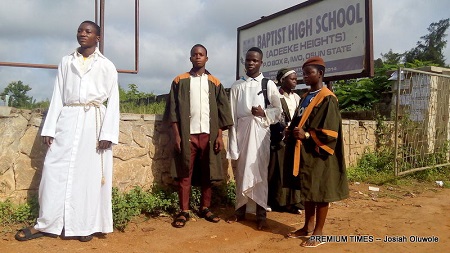
File photo: Students wear religious robes to school in Osun
Let’s call a spade by its name. That some Christian students
dramatically attended school in their religious robes and garments, in
protest against a court verdict that allows female Muslim students wear
hijab in public schools in the State of Osun last week, clearly points
to the subtle tussle for supremacy between Christians and Muslims in the
State. This might be too harsh for us to admit, but the fire beneath
the “hijab” and “garment” saga is gradually spreading out for all to
see.
If we could all recall, the same drama played out in the run up to
the Osun State gubernatorial election in 2014. Then, it was trivialised
as works of some politicians trying to play the religious card. However,
we would be living in a fool’s paradise to believe that same old
narrative this time.
Issues that revolve around religion are sensitive and generally
very volatile. Therefore, there is no point in apportioning blames in
this case, as doing so could only escalate the issue and drift our
attentions away from the main issue and its serious implications.
Looking back on how the hijab saga started in Osun State, how the
Osun State Muslim community approached the court for an order to allow
female Muslim students wear the hijab in public schools in 2013, the
eventual judgment of a high court that permitted the use of hijab in
public schools, the response of the Osun State Christian Association of
Nigerian to the judgment, and the drama that ensued in two secondary
schools in Osun State last week, one could easily understand that the
unfolding drama is far more religious than political.
Without mincing words, students who wore robes and church garments
to school last week Tuesday were mere gloves covering the iron fists of
religious actors, rebuffing a court order they perceive would entrench
the Islamic faith in public schools in Osun State. While on the other
hand, Muslims in Osun State do not appear to be willing to shift ground
on their interest. For them, seeing their children wear hijab to school
is a right.
This makes the issue fairly knotty.
Unfortunately, these religious actors fail to realise that wearing
the hijab or beret in schools is not integral to the quality education
being offered and received in any way. By this, I mean it would have
made sense if the bone of contention of these religious gladiators had
something to do with the improvement of the academic performance of
students in the state.
According to reports on the May/June 2015 West African Senior
School Certificate Examination (WASSCE) performance chart, Osun State
placed 29 out of 36 states, with just “8,801” out of its “48,818”
candidates obtaining the basic entry requirement for university
admission. Of course, this would make no meaning to religious actors,
distracting students with their shenanigans.
But, why stir the hornets nest by promoting divisive religious
tussles amongst students while the scars of Ife-Modakeke crisis is yet
to properly heals?
Yes, the Ife-Modakeke crisis was not religious. Yet, it resonates well when we reflect on a Yoruba proverb that says: “A man whose mother was killed by a mad man would/ought to scamper for safety at the sight of a mechanic”.
In other words, had these religious actors ruminated on the devastation
of the Ife-Modakeke crisis, perhaps they would have refrained from
sowing the seed of religious discord in Osun State. Most especially now
that it appears that the ”Omoluabi” bond that unifies Osun people is
gradually giving way to divisive religious rivalry.
That said, whichever way we choose to look at it, Christians and
Muslims in Osun State need to rethink the future implication of their
actions and give peace a chance. That a court order allows female Muslim
students to wear hijab to school does not amount to the “Islamisation”
of Osun State, and neither does the banning of the use of hijab in
public schools make female Muslim students succumb to Christianity in
any way. Allowing Christians, Muslims and traditionalists wear their
religious outfits to school in a wilful emphasis of their religious
identities can only project Osun as the world’s capital of confusion.
Given the aforementioned, it would be logical and safe to suggest
that public schools in Osun State essentially operate as secular
institutions, working strictly by rules and regulations that our
conflicting religious interests cannot override. Public schools ought to
be platforms for raising students and building up communities
irrespective of individual differences.
More importantly, the governor of Osun State, Ogbeni Rauf
Aregbesola needs to carefully manage this delicate issue. Because, if
the fire burning underneath the “hijab” and “garment” saga is allowed to
spread, it would not only consume his legacy, political future and
political party, it would cause more damage than we can envisage within
and beyond Osun State. No doubt, it’s still a laughable and manageable
mess for now, but no one can tell what it could morph into in the
nearest future.
******************
By Ahmed Oluwasanjo.
By Ahmed Oluwasanjo writes from Abuja and can be reached through ahmedoluwasanjo@gmail.com and @ahmedrazak3.






No comments :
Post a Comment